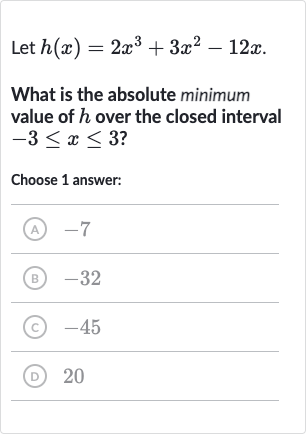Full solution
Q. Let .What is the absolute minimum value of over the closed interval ?Choose answer:(A) (B) (C) (D)
- Find Derivative of : To find the absolute minimum value of the function over the closed interval , we need to find the critical points of within the interval and evaluate at the endpoints of the interval. Critical points occur where the derivative is zero or undefined. Let's find the derivative of .
- Find Critical Points: Now we need to find the values of where .Divide by to simplify:Factor the quadratic equation:The solutions are and .
- Evaluate at Critical Points and Endpoints: We have found two critical points, and , within the interval . Now we need to evaluate at these critical points and at the endpoints of the interval, and . Let's calculate , , , and .
- Calculate : Now let's calculate :
- Calculate : Next, we calculate :
- Calculate : Finally, we calculate :
- Calculate : We have evaluated at the critical points and the endpoints of the interval. The values are:The absolute minimum value of over the interval is the smallest of these values, which is .

